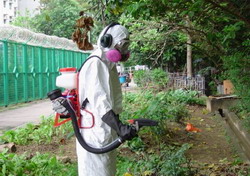Aims
- To prevent and control the breeding of disease vectors.
- To control the breeding of arthropod pests which cause nuisance to people.
Responsibilities
Pest control work, such as the control of rodents, mosquitoes and other arthropod pests with public health importance is carried out by the Pest Control Teams of Food and Environmental Hygiene Department. The methodology in pest control is continuously reviewed to ensure effectiveness and efficacy in abating the disease vectors.
Extermination of pests and prevention of disease
Maintenance of personal and environmental hygiene at a high standard all the time is the fundamental and most effective method to prevent and control pest borne diseases. Pest disinfestation operation using the appropriate pesticide is only a supplementary measure in the control of diseases where pests act as the vectors or mechanical carriers.
Other Pest Control
 Disinfestation of such pests is generally dealt with by using the appropriate insecticide. Pest control staff of our department also gives advice to the people concerned on making the conditions unsuitable for the breeding or attraction of pests.
Disinfestation of such pests is generally dealt with by using the appropriate insecticide. Pest control staff of our department also gives advice to the people concerned on making the conditions unsuitable for the breeding or attraction of pests.
Our department is providing wasp/wild bees disinfestations services. However, the services would not be provided to private and public residential premises appointed with property management agents as from 1 March 2005. The services provided to private non-residential premises had been stopped as from 1 September 2005 as well. Pest control companies are available for choice by property management companies for providing wasp/wild bees disinfestations services if necessary.
Some diseases that can be transmitted by vectors are:
| Vector | Vector-borne diseases |
|---|---|
| Rodents | Hantavirus infection, leptospirosis and rat bite fever |
| Mosquitoes | Dengue fever, Japanese encephalitis, malaria, chikungunya fever, Zika virus infection, yellow fever and various forms of filariasis |
| Fleas | Plague, urban typhus and cestodes |
| Ticks | Spotted fever and Q fever |
| Mites | Scrub typhus |
| Besides, rodents, flies and cockroaches are mechanical carriers of the pathogens of : typhoid, dysentery, cholera, diarrhoea, polio, etc. | |